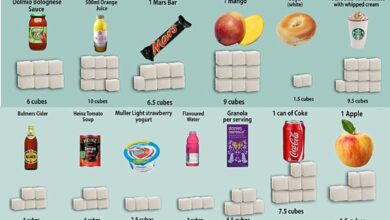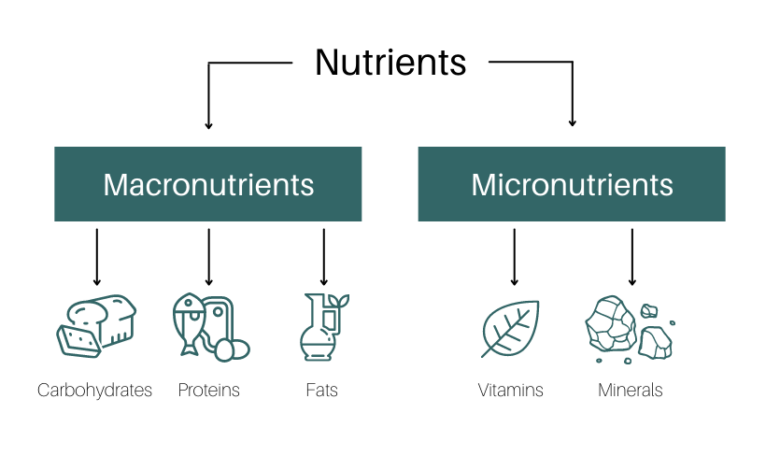
Macronutrients vs Micronutrients: How Are They Different?
Macronutrients vs micronutrients how are they different – Macronutrients vs micronutrients: how are they different? You hear these terms thrown around in the health and fitness world, but what exactly do they mean, and why are they so important? Think of it like this: macronutrients are the building blocks of our bodies, providing the energy we need to function.
Micronutrients, on the other hand, are like the tiny, but mighty, workers that keep everything running smoothly. They’re essential for a wide range of bodily functions, from boosting our immune system to maintaining strong bones.
In this post, we’ll delve deeper into the world of macronutrients and micronutrients, exploring their roles, their differences, and why understanding them is crucial for a healthy lifestyle.
Introduction to Macronutrients and Micronutrients
The food we eat is comprised of various nutrients, each playing a vital role in maintaining our health and well-being. These nutrients are categorized into two main groups: macronutrients and micronutrients. While both are essential for our bodies, they differ significantly in their functions and the amounts we require.Macronutrients and micronutrients are both essential for maintaining a healthy body.
Understanding their differences and roles is crucial for making informed dietary choices.
Macronutrients: The Building Blocks
Macronutrients are the nutrients our bodies need in large quantities to provide energy and support growth and development. They are the primary sources of calories and include carbohydrates, fats, and proteins. Carbohydrates are the body’s primary source of energy, providing fuel for our muscles, brain, and other organs.
They are found in a variety of foods, including grains, fruits, vegetables, and dairy products. Fats are essential for energy storage, hormone production, and insulation. They are also important for the absorption of certain vitamins. Fats are found in foods such as oils, nuts, seeds, and fatty fish.Proteins are the building blocks of our bodies, playing a crucial role in tissue repair, growth, and immune function.
Macronutrients, like carbs, fats, and proteins, are the building blocks of our bodies, while micronutrients, like vitamins and minerals, are essential for various bodily functions. A balanced diet, rich in both macronutrients and micronutrients, is key to overall health.
A great example of a meal that incorporates both is a chicken and sweet potato farro bowl , providing protein, complex carbs, and fiber, along with essential vitamins and minerals. Understanding the difference between macro and micronutrients helps us make informed food choices to nourish our bodies and maintain optimal well-being.
They are found in foods like meat, poultry, fish, beans, lentils, and dairy products.
Micronutrients: The Essential Allies
Micronutrients, on the other hand, are required in smaller amounts but are equally essential for our health. These nutrients support various bodily functions, from regulating metabolism to protecting against disease. Micronutrients include vitamins and minerals.Vitamins are organic compounds that perform various functions in the body, such as supporting immune function, vision, and cell growth.
They are found in fruits, vegetables, whole grains, and dairy products.Minerals are inorganic substances that are essential for various bodily functions, such as bone health, nerve function, and muscle contraction. They are found in a wide variety of foods, including fruits, vegetables, whole grains, and dairy products.
Macronutrients
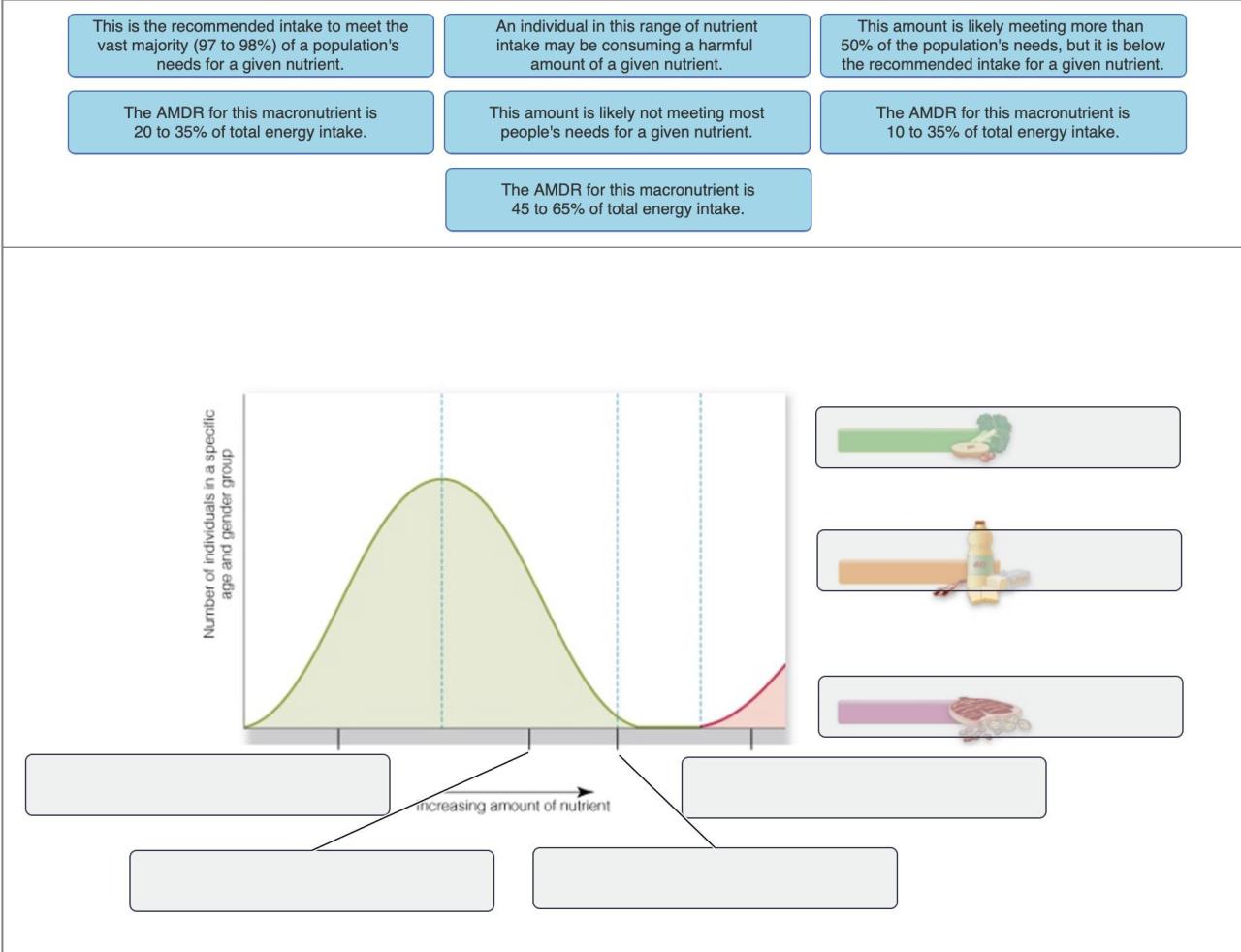
Macronutrients are essential nutrients that our bodies need in large quantities to function properly. They provide energy, build and repair tissues, and support overall health. The three main macronutrients are carbohydrates, fats, and proteins.
Energy Density of Macronutrients
Each macronutrient provides a different amount of energy per gram. This is known as energy density. Understanding energy density is important for managing calorie intake and achieving health goals.
Carbohydrates provide 4 calories per gram.Fats provide 9 calories per gram.Proteins provide 4 calories per gram.
- Carbohydratesare the body’s primary source of energy. They are broken down into glucose, which is used by cells for fuel. Carbohydrates are found in a wide variety of foods, including grains, fruits, vegetables, and dairy products.
- Fatsare a concentrated source of energy. They are also important for hormone production, cell membrane structure, and insulation. Fats are found in foods like oils, nuts, seeds, and fatty meats.
- Proteinsare essential for building and repairing tissues, making enzymes and hormones, and transporting nutrients. They are found in foods like meat, poultry, fish, eggs, beans, and dairy products.
Micronutrients
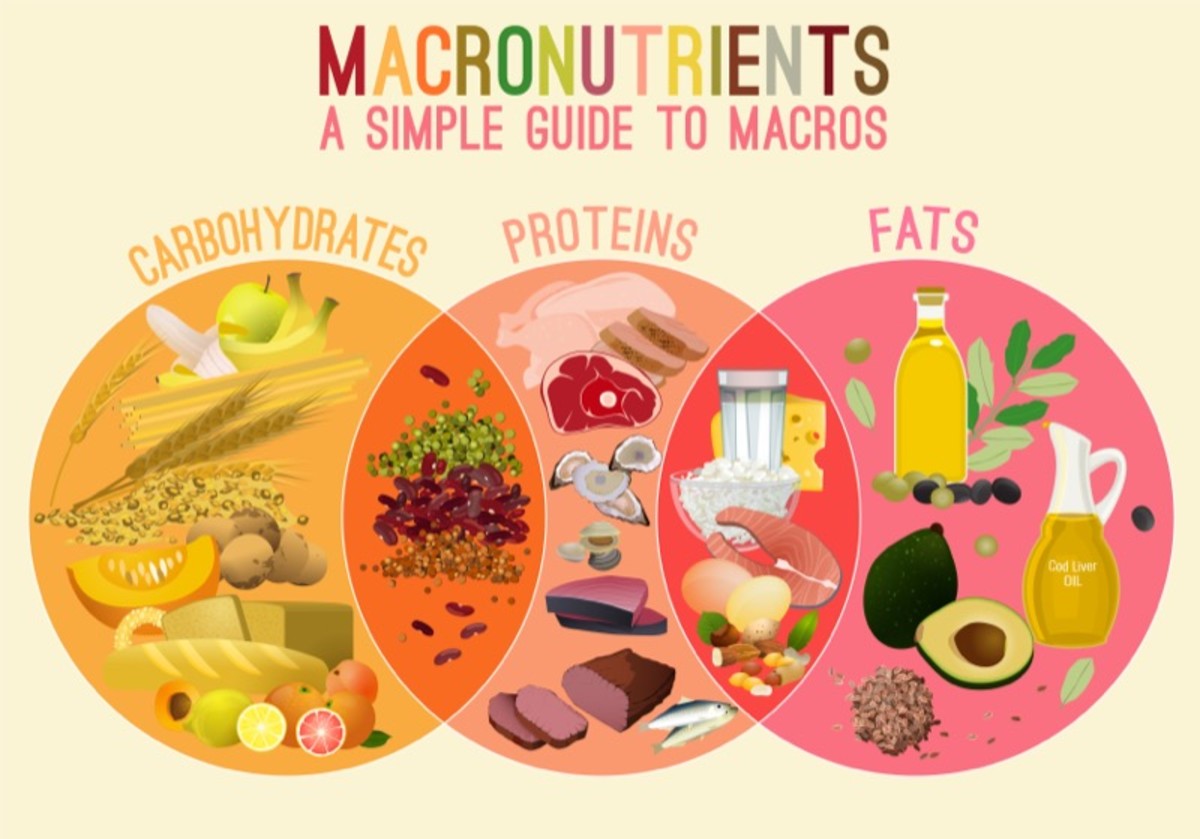
Micronutrients, unlike macronutrients, are needed in smaller quantities but are equally essential for optimal health and well-being. These nutrients are crucial for supporting various bodily functions, including immune function, energy metabolism, and maintaining bone health.
Roles of Micronutrients
Micronutrients play a vital role in various biological processes. They act as catalysts, coenzymes, and building blocks for essential compounds.
Categories of Micronutrients
Micronutrients are categorized into vitamins and minerals.
Vitamins
Vitamins are organic compounds that are essential for various bodily functions. They cannot be synthesized by the body and must be obtained from dietary sources. Vitamins are classified into two groups: fat-soluble and water-soluble.
- Fat-soluble vitamins(A, D, E, and K) are stored in the body’s fat tissues and can accumulate over time. They are absorbed from the digestive tract with the help of fats.
- Water-soluble vitamins(B vitamins and vitamin C) are not stored in the body and are excreted in urine. They need to be replenished regularly through dietary intake.
Minerals
Minerals are inorganic substances that are essential for various bodily functions. They are found in the earth’s crust and are absorbed from the soil by plants, which are then consumed by humans. Minerals are classified into two groups: major minerals and trace minerals.
- Major minerals(calcium, phosphorus, magnesium, sodium, potassium, chloride, and sulfur) are required in larger amounts than trace minerals.
- Trace minerals(iron, zinc, copper, manganese, iodine, selenium, fluoride, and chromium) are required in smaller amounts.
Importance of Micronutrients in Maintaining Health
Immune Function
Micronutrients play a crucial role in maintaining a healthy immune system. Vitamins A, C, D, E, and zinc are essential for the production and function of immune cells, which help fight infections.
Bone Health
Calcium, phosphorus, magnesium, and vitamin D are essential for maintaining bone health. Calcium and phosphorus are the primary building blocks of bones, while magnesium and vitamin D help regulate calcium absorption and bone metabolism.
Energy Metabolism
Several micronutrients, including B vitamins, iron, and iodine, are essential for energy metabolism. B vitamins are involved in converting food into energy, while iron is essential for the transport of oxygen, which is required for energy production. Iodine is crucial for the production of thyroid hormones, which regulate metabolism.
Macronutrients vs. Micronutrients: Dietary Requirements
Understanding the recommended daily intake of macronutrients and micronutrients is crucial for maintaining a balanced diet and overall health. These nutrients are essential for various bodily functions, and consuming them in appropriate amounts ensures optimal performance.
Daily Requirements for Macronutrients and Micronutrients
The recommended daily intake of macronutrients and micronutrients varies based on factors like age, gender, activity level, and health conditions. However, general guidelines exist to provide a balanced dietary framework.
| Nutrient Group | Recommended Daily Intake | Functions |
|---|---|---|
| Carbohydrates | 45-65% of total daily calories | Provide energy, fuel brain function, and support muscle activity. |
| Protein | 10-35% of total daily calories | Build and repair tissues, produce enzymes and hormones, and contribute to immune function. |
| Fat | 20-35% of total daily calories | Provide energy, support hormone production, and protect organs. |
| Vitamins | Vary depending on the specific vitamin | Support various bodily functions, including immune function, vision, and cell growth. |
| Minerals | Vary depending on the specific mineral | Contribute to bone health, fluid balance, and nerve function. |
Consequences of Nutrient Deficiencies or Excesses
Maintaining a balanced diet is crucial because both nutrient deficiencies and excesses can have adverse effects on health.
Nutrient Deficiencies
- Carbohydrate Deficiency:Can lead to fatigue, weakness, and impaired brain function.
- Protein Deficiency:Can result in muscle loss, impaired immune function, and delayed wound healing.
- Fat Deficiency:Can cause hormonal imbalances, dry skin, and hair loss.
- Vitamin Deficiency:Can manifest in various symptoms, depending on the specific vitamin, including vision problems, anemia, and impaired bone health.
- Mineral Deficiency:Can lead to bone weakness, muscle cramps, and fatigue.
Nutrient Excesses
- Carbohydrate Excess:Can contribute to weight gain, increased risk of type 2 diabetes, and cardiovascular disease.
- Protein Excess:Can strain the kidneys and increase the risk of certain cancers.
- Fat Excess:Can lead to obesity, heart disease, and stroke.
- Vitamin Excess:Can be toxic, depending on the specific vitamin, leading to nausea, vomiting, and other health issues.
- Mineral Excess:Can cause various health problems, including kidney stones, heart arrhythmias, and nerve damage.
A balanced diet is essential for maintaining optimal health and preventing nutrient deficiencies or excesses.
Understanding Food Labels
Food labels are a valuable tool for making informed dietary choices. They provide essential information about the nutritional content of food products, helping you understand the amounts of macronutrients and micronutrients you’re consuming.
Reading Food Labels
To effectively utilize food labels, it’s crucial to understand how to read and interpret the information presented. Here’s a step-by-step guide:
Serving Size
The serving size is the first crucial piece of information on a food label. It represents the amount of food that the label’s nutritional information refers to.
The serving size may not always align with the amount you typically consume.
For example, a bag of chips might have a serving size of 1 ounce, but you might eat 2 or 3 ounces in one sitting. It’s important to adjust the nutrient values accordingly if you’re consuming more than one serving.
Calories
The calorie count tells you the total number of calories in one serving of the food. Calories are a measure of energy, and understanding the calorie content of your food is essential for managing your weight and overall health.
Macronutrients
Food labels list the amounts of macronutrients—fat, carbohydrates, and protein—per serving.
These values are typically expressed in grams.
Understanding the macronutrient breakdown can help you make choices that align with your dietary goals.
Micronutrients
Food labels also provide information on essential micronutrients, such as vitamins and minerals. These are typically listed as percentages of the Daily Value (%DV).
%DV
The %DV represents the percentage of a specific nutrient that a serving of food contributes to a standard daily diet.
Macronutrients like carbs, fats, and proteins are the building blocks of our bodies, while micronutrients like vitamins and minerals act as catalysts for vital processes. A great way to get a good balance of both is by incorporating a variety of nutrient-rich foods into your diet, like those found in a mushrooms brussels sprouts tofu grain bowls.
These bowls offer a diverse range of macronutrients and micronutrients, making them a delicious and healthy meal choice. Understanding the difference between macronutrients and micronutrients is key to building a well-rounded and balanced diet.
A %DV of 5% or less is considered low, while a %DV of 20% or more is considered high.
Macronutrients, like carbs, fats, and proteins, provide energy, while micronutrients, like vitamins and minerals, support bodily functions. Staying on track with your nutrition during summer can be a challenge, but it’s crucial for maintaining energy levels and overall well-being.
Check out these healthy eating tips for summer to keep in track to help you stay on top of your macronutrient intake and ensure you’re getting the micronutrients you need to thrive. Remember, a balanced diet that includes both macronutrients and micronutrients is key to feeling your best all summer long!
Using %DV can help you determine whether a food is a good source of particular nutrients.
Micronutrient Deficiencies and Supplements: Macronutrients Vs Micronutrients How Are They Different
Micronutrients are essential for various bodily functions, and their deficiency can lead to various health issues. Understanding the common micronutrient deficiencies and their potential health implications is crucial for maintaining good health. Dietary supplements can play a role in addressing these deficiencies, but it’s essential to consult a healthcare professional before taking any supplements.
Common Micronutrient Deficiencies and Their Potential Health Implications
Micronutrient deficiencies are prevalent worldwide, particularly in developing countries. Some of the most common micronutrient deficiencies and their potential health implications include:
- Iron Deficiency Anemia: Iron is crucial for red blood cell production, and its deficiency can lead to anemia. Symptoms include fatigue, weakness, shortness of breath, pale skin, and headaches.
- Vitamin A Deficiency: Vitamin A is essential for vision, immune function, and cell growth. Deficiency can lead to night blindness, impaired immune function, and increased susceptibility to infections.
- Iodine Deficiency: Iodine is essential for thyroid hormone production. Deficiency can lead to hypothyroidism, characterized by fatigue, weight gain, and cognitive impairment. In severe cases, iodine deficiency can cause goiter, an enlargement of the thyroid gland.
- Zinc Deficiency: Zinc is involved in numerous bodily functions, including immune function, wound healing, and cell growth. Deficiency can lead to impaired immune function, delayed wound healing, hair loss, and diarrhea.
- Vitamin D Deficiency: Vitamin D is crucial for calcium absorption and bone health. Deficiency can lead to rickets in children and osteoporosis in adults, characterized by weak bones and increased risk of fractures.
- Folate Deficiency: Folate is essential for DNA synthesis and cell division. Deficiency during pregnancy can lead to neural tube defects in the developing fetus. Folate deficiency can also cause megaloblastic anemia, a type of anemia characterized by large, immature red blood cells.
- Vitamin B12 Deficiency: Vitamin B12 is essential for nerve function and red blood cell production. Deficiency can lead to anemia, fatigue, numbness, tingling, and cognitive impairment.
Role of Dietary Supplements in Addressing Micronutrient Deficiencies
Dietary supplements can be a valuable tool for addressing micronutrient deficiencies, especially when dietary intake is insufficient. However, it’s important to note that supplements should not replace a healthy diet. They are intended to complement a balanced diet, not substitute it.
- Iron Supplements: Iron supplements are often prescribed to treat iron deficiency anemia. They are available in various forms, including ferrous sulfate, ferrous gluconate, and iron polysaccharide complex.
- Vitamin A Supplements: Vitamin A supplements are available in various forms, including retinol, retinal, and beta-carotene. They are often prescribed to treat vitamin A deficiency and may be beneficial for maintaining good vision and immune function.
- Iodine Supplements: Iodine supplements are available in various forms, including potassium iodide and sodium iodide. They are often prescribed to treat iodine deficiency and may be beneficial for maintaining thyroid function.
- Zinc Supplements: Zinc supplements are available in various forms, including zinc sulfate, zinc gluconate, and zinc acetate. They are often prescribed to treat zinc deficiency and may be beneficial for immune function, wound healing, and cell growth.
- Vitamin D Supplements: Vitamin D supplements are available in various forms, including cholecalciferol (vitamin D3) and ergocalciferol (vitamin D2). They are often prescribed to treat vitamin D deficiency and may be beneficial for bone health.
- Folate Supplements: Folate supplements are available in various forms, including folic acid and folinic acid. They are often prescribed to prevent neural tube defects in pregnant women and to treat folate deficiency anemia.
- Vitamin B12 Supplements: Vitamin B12 supplements are available in various forms, including cyanocobalamin and hydroxocobalamin. They are often prescribed to treat vitamin B12 deficiency and may be beneficial for nerve function and red blood cell production.
Importance of Consulting a Healthcare Professional Before Taking Supplements, Macronutrients vs micronutrients how are they different
While dietary supplements can be beneficial for addressing micronutrient deficiencies, it’s crucial to consult a healthcare professional before taking any supplements.
“Self-treating with supplements can be dangerous, and it’s essential to consult a healthcare professional to determine the appropriate dosage and type of supplement for your individual needs.”
- Dosage: Supplements should be taken at the recommended dosage. Excessive intake of certain micronutrients can be harmful.
- Interactions: Some supplements can interact with medications or other supplements, potentially leading to adverse effects.
- Underlying Conditions: Some supplements may not be suitable for individuals with certain underlying medical conditions.
Conclusion
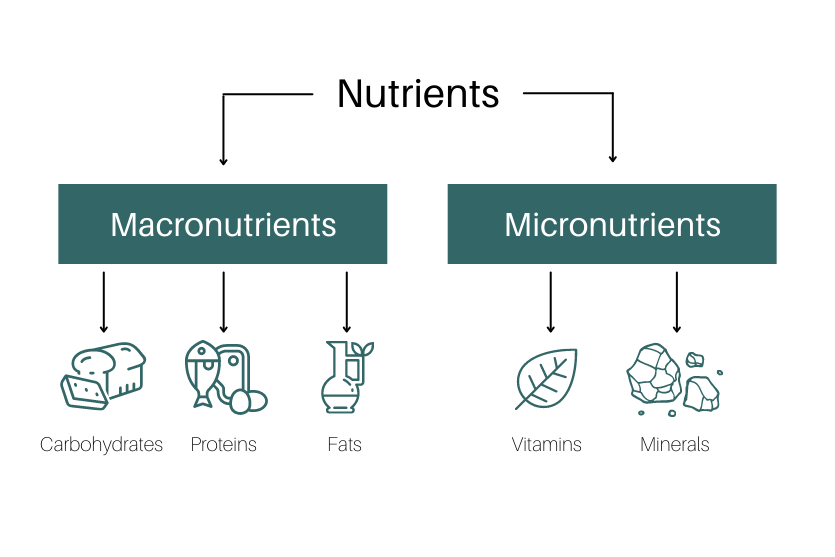
It’s crucial to recognize that both macronutrients and micronutrients are essential for maintaining a healthy and vibrant life. While macronutrients provide energy and building blocks for our bodies, micronutrients act as catalysts for various metabolic processes, ensuring optimal functioning. Striving for a balanced diet rich in both categories is the key to unlocking your body’s full potential.
Strategies for a Balanced Diet
A balanced diet encompasses consuming a wide variety of foods from all food groups. This approach ensures that you receive a comprehensive spectrum of nutrients, minimizing the risk of deficiencies. Here are some actionable tips to incorporate diverse foods into your daily meals:
- Fruits and Vegetables:Aim for at least five servings daily, including a variety of colors. This provides essential vitamins, minerals, and antioxidants. Examples include berries, leafy greens, citrus fruits, and root vegetables.
- Whole Grains:Choose whole grains over refined grains whenever possible. Whole grains are rich in fiber, which promotes digestive health and helps regulate blood sugar levels. Examples include brown rice, quinoa, oats, and whole-wheat bread.
- Lean Protein Sources:Include lean protein sources in your meals and snacks. These provide essential amino acids for building and repairing tissues. Examples include fish, poultry, beans, lentils, and tofu.
- Healthy Fats:Incorporate healthy fats into your diet, such as those found in avocados, nuts, seeds, and olive oil. These fats are essential for hormone production and cell function.
- Hydration:Drink plenty of water throughout the day to stay hydrated and support various bodily functions. Aim for at least eight glasses of water daily.
Benefits of a Balanced Diet
A balanced diet offers a multitude of benefits for your overall health and well-being. Here are some key advantages:
- Weight Management:A balanced diet, combined with regular physical activity, can help you maintain a healthy weight. This is crucial for preventing chronic diseases such as obesity, diabetes, and heart disease.
- Improved Energy Levels:A balanced diet provides your body with the necessary fuel to function optimally, leading to increased energy levels and reduced fatigue.
- Enhanced Cognitive Function:Certain nutrients, such as omega-3 fatty acids and B vitamins, play a vital role in brain health and cognitive function. A balanced diet can contribute to improved memory, focus, and overall mental well-being.
- Stronger Immune System:A diet rich in fruits, vegetables, and whole grains provides essential vitamins, minerals, and antioxidants that strengthen your immune system, helping your body fight off infections and diseases.
- Reduced Risk of Chronic Diseases:A balanced diet is a cornerstone of disease prevention. It can significantly reduce your risk of developing chronic conditions such as heart disease, stroke, type 2 diabetes, and some types of cancer.
Final Thoughts
In the end, achieving a balanced diet is all about finding the right mix of macronutrients and micronutrients. By understanding their roles and incorporating a variety of nutrient-rich foods into your meals, you can fuel your body for optimal health and well-being.
So, the next time you see a food label, take a moment to check out the macronutrients and micronutrients. It’s a small step towards making informed choices about your diet and supporting your body’s incredible ability to thrive.




